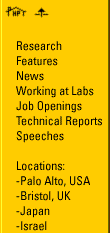| |
HP Labs Technical Reports
Click here for full text:

Effects of Noise on Quantum Error Correction Algorithms
Spiller, Timothy P.; Barenco, Adriano; Brun, Todd A.; Schack, Rudiger
HPL-97-07
January 8, 1997
External
Keyword(s): quantum computation; decoherence; quantum error correction
Abstract: It has recently been shown that there are efficient algorithms for quantum computers to solve certain problems, such as prime factorization, which are intractable to date on classical computers. The chances for practical implementation, however, are limited by decoherence, in which the effect of an external environment causes random errors in the quantum calculation. To combat this problem, quantum error correction schemes have been proposed, in which a single quantum bit (qubit) is "encoded" as a state of some larger number of qubits, chosen to resist particular types of errors. Most such schemes are vulnerable, however, to errors in the encoding and decoding itself. We examine two such schemes, in which a single qubit is encoded in a state of $n$ qubits while subject to dephasing or to arbitrary isotropic noise. Using both analytical and numerical calculations, we argue that error correction remains beneficial in the presence of weak noise, and that there is an optimal time between error correction steps, determined by the strength of the interaction with the environment and the parameters set by the encoding.
31 Pages
Back to Index
|




